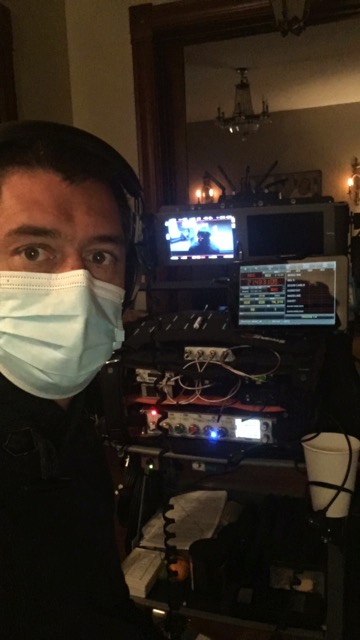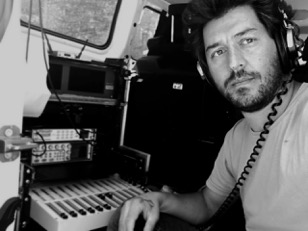
The pandemic brought a huge challenge to the film industry, evolve or surrender. Those like sound mixer Daniel Molina and his collaborators had no doubt as to their response; they would implement new ways of creating productions as they’d always done but using that same source of creativity in their work procedures. Since the film industry’s inception, a scenario like Covid 19 had never been seen. Molina concedes that working during this time was never easy but it did bring the same reward that he’s always received in pushing himself to the heights of his abilities. The result of this determination is a multitude of new films that are about to be released, all of which contain the contributions of Mr. Molina and his expertise in delivering the sounds that make the visuals of these film come alive.

It’s difficult to think of a more challenging film to create during a pandemic than Please Baby Please. Director/writer Amanda Kramer’s film about a newlywed couple whose interaction with a gang unearths a dangerous aspect of the couple’s sexual identity is fraught with potential production impediments. In addition to the need for delicacy in filming the intimate physical scenes, Covid protocols made the process seem impossible. The casts boast such acclaimed talent as SAG Award-Winning and BAFTA Nominated Actress Andrea Riseborough (of four time Oscar Winning Film Birdman), Primetime Emmy Nominated Actress Demi Moore, and Harry Melling (of the Harry Potter franchise, The Ballad of Buster Scruggs, The Queen’s Gambit). The experience was most certainly an unusual one for Molina who informs, “I was contacted by the producers because they were looking for someone who could handle a production where the conditions were very challenging due to how delicate the scenes were and the way the film was photographed. Covid was an ever present entity. When the boom operator got sick and a replacement couldn’t be found in time due to strict Covid protocols, I took over running things as a ‘one-man band’ so to speak. The film ended up being a very positive experience for me because working with director Amanda Kramer was amazing. Being part of this taught me a new way of looking at my work and understanding the actor’s work better, which helps me choose the right tools to capture the sound in the best possible way.”
When Paris Films (the production company for Please Baby Please) began their next film The Mistress, they asked Daniel to join as sound mixer. Mr. Molina admits that once he understood that the film would star John Magaro (of Oscar and BAFTA Award Winning film The Big Short, Netflix’s Primetime Emmy Award Winning Series Orange is the New Black), he instantly agreed. Director Greg Pritikin’s vision for capturing the majority of scenes as a “oner” necessitated a highly detailed and customized approach for Daniel. He notes, “There was a recurring conversation with Greg: how we do this? The story takes place in an old three floor Victorian house with extremely narrow wooden stairs. The idea was to do the majority of the scenes in oners. The action consisted of the actors having to go up or down the stairs and being able to move freely throughout the house, meaning that the whole house became the set. We had to plan every scene carefully because we needed the actors, the camera operator, and the boom op to rehearse all the movements while creating the choreography. Since the actions took place practically throughout the house, the boom op and myself had to prepare our material to be able to cover the entire house, and that often involved making antenna cables runs from the attic to the basement: 4 floors.”
Presently, Daniel is working on the feature film Bluefish, an adventurous narrative which explores the experiences of people throughout the world who are emerging from the isolation imposed by Covid. In a scenario of art meets reality, Daniel and a small crew travelled to the homes of the actors during the pandemic to capture the footage and sounds for the film. While the vast majority of professionals throughout the industry found themselves unable to work, Daniel embraced the opportunity with the necessary respect it demanded. He confides, “It was an unprecedented experience. It was my first time doing something like this and I think the very first time for everybody; not only the crew but in the entire industry. The pandemic made us to do our job in a different way: you can’t be close to the talent, you have to figure it out how to capture the sound while telling the actors how to mike themselves up, and adapt the use of equipment for different environment in the film industry.”
Writer: Arlen Gann


Be the first to comment on "Persevering Productions and Discovering New Ways with Daniel Molina"